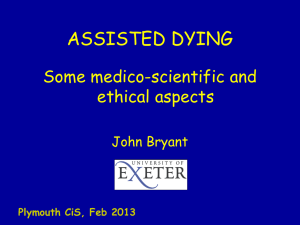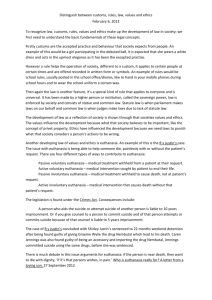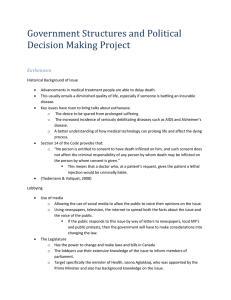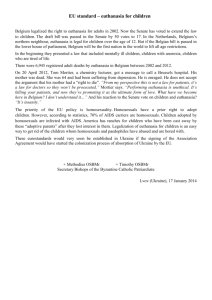Euthanasia and Physician Assisted Suicide
advertisement
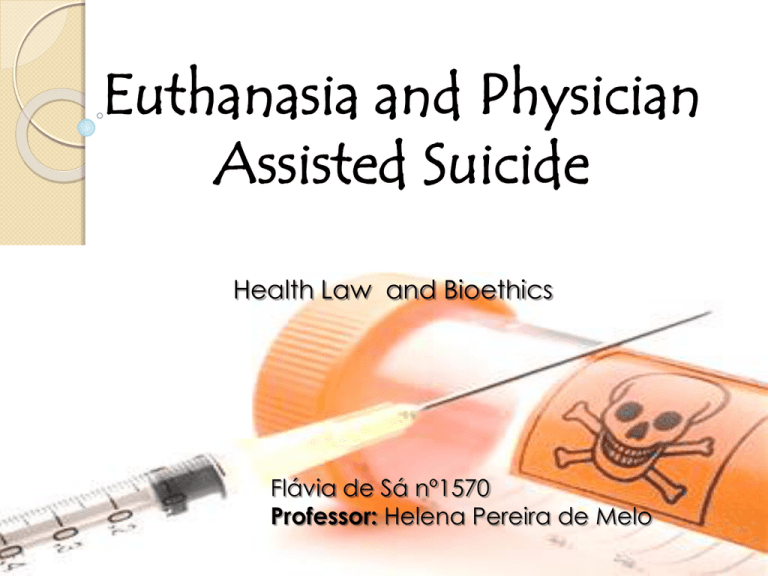
Euthanasia and Physician Assisted Suicide Health Law and Bioethics Flávia de Sá nº1570 Professor: Helena Pereira de Melo • Euthanasia came from de Greek word “euthanatos”, which means “good death” or “soft death” – “the act of deliberately killing a patient afflicted with a painful and incurable disease in order to put an end to his/her suffering” (Paulo Pulido Adragão). Voluntary euthanasia: when the procedure takes place as the result of a request made by a competent patient. Involuntary euthanasia: euthanasia is performed against the will of the patient. Non- voluntary euthanasia: euthanasia is performed on a patient without request(unconscious patient or patients with Alzheimer’s disease, for instance). Active Euthanasia: when a doctor kills his patient by administrating a lethal injection. Passive Euthanasia: when the death occurs by omission of the doctor . Voluntary Active Euthanasia vs Physician Assisted Suicide • PAS is “halfway between suicide and voluntary euthanasia” (Paulo Pulido Adragão). • This procedure takes place when a patient, not being able to commit suicide by his/her own means, seeks assistance from a physician to do it. • It is the patient who performs the last act which causes the death. • The physician’s role is to provide the necessary means and advice, also making sure death occurs without pain to the patient. The controversy Arguments in favor Autonomy The right to quality of life Human dignity Compassion The final benefit Arguments against Sanctity of human life; More pressure upon the most vulnerable into choosing death by euthanasia or assisted suicide; Autonomy ? - autonomy is not absolute being subject to several restrictions; - The effects of an undiagnosed depressive illness; - the final decision is taken by the doctor; A change in the law in order to legalize VAE/PAS, would subvert the integrity of medical profession; Possible abuses on the performance of such Practices; Showing compassion towards the patient is about seeking to relieve his/her physical and mental pain, but respecting the value of life; These procedures undermine the palliative care as a real alternative; importance of Dangerous obstacle to the improvement of more effective therapies for the cure of several diseases. Physician Assisted Suicide • Among those who support the legalization of this practice is often said there is discrimination between those who are able to commit suicide by themselves and those who are not capable to do that by their own means, needing the assistance of another person to achieve their wish. Is there a violation of the principle of equality in these situations ? True story – Marc & Eddy Verbessen • This is the case of two Belgian twins, 45 years old, both born deaf, who requested to be euthanized after discovering that they were going blind with glaucoma. • Belgium was the second country in the world, after Netherlands, to allow euthanasia in September 2002. •After spending all their lives together, the belgian twins couldn’t bear the thought of not being able to see each other. • The local hospital refused the twins’ request arguing that their situation didn’t fulfill the strict requirements imposed by belgian law regulating euthanasia. It took the belgian twins almost two years to find a hospital willing to comply with their will to die, the Brussels University Hospital. • On 14 December 2012, the twins finally accomplished their wish after being administered with lethal injections. Their last moments were spent along with their parents and older brother, Dirk Verbessen. • Some days after, Dirk told to the press his last conversation with his brothers- “I tried to talk them out of it even at the last moment. Together with my parents, I said goodbye. Marc and Eddy waved again at us. ‘Up in the sky’, they said ‘Up in the sky’, we replied. And then it was over”. The Belgian law The Belgian Act on Euthanasia • On 16 May of 2002 and after intense debate, the Belgian parliament approved the bill on euthanasia with 86 votes in favor, 51 against and 10 abstentions. The Senate had already approved the proposed law in 2011, with 44 votes in favor, 23 against and 2 abstentions. The new law came into force on 23 September of 2012. • According to Belgian law, euthanasia remains a crime, not punishable if certain requirements are met. •The legal act starts by providing a definition of euthanasia: “intentionally terminating life by someone other than the person concerned, at the latter’s request” (chapter I, section 2). The the law sets out a number of strict requirements under which the performance of euthanasia is available (chapter II, section 3): • The patient is an adult or an emancipated minor, and is “legally competent and conscious at the moment of making the request”; • “The request is voluntary, well considered and repeated, and is not the result of any external pressure”; • The patient is in a condition of “constant and unbearable physical/mental suffering that cannot be alleviated, resulting from a serious and incurable disorder caused by illness or accident”. In addition, before carrying out the procedure the physician must: • Inform the patient about his/her health condition and life expectancy and discuss with the patient his/her request and the possibility of alternative treatments like palliative care. • Be certain of the patient’s condition and of the durable nature of his/her request. “To this end, the physician has several conversations with the patient spread out over a reasonable period of time, taking into account the progress of the patient’s condition”; • “Consult another doctor about the serious and incurable character of the disorder”. • According to this law, euthanasia is not limited to the terminal ill. In the case of a request made by a nonterminal ill, the same requirements must be respected. Besides the attending physician must also consult a second physician. • In these situations the attending physician must “allow at least one month between the patient’s written request and the act of euthanasia”. • The patient’s request must be in writing, dated and signed by the patient himself/herself. • The case of the belgian twins brothers was particularly controversial because none of them was terminally ill or suffering physical pain. •Shortly after Marc and Eddy death, the Belgian government announced the intention to amend the euthanasia law in order to extend it to children and patients with Alzheimer’s disease. The Portuguese law •Constitution of Portuguese Republic: right to life (art.24º) right to personal integrity (art.25º) • European Convention on Human Rights “Everyone’s right to life shall be protected by law. No one shall be deprived of his life intentionally…” (art.2, nr.1) applicable in portuguese internal law by disposition of article 8º, nr. 2 of the Constitution. • Code of Medical Deontology “The physician must keep respect for the patient’s dignity at the end of his/her life ” (art.57º, nr.1). The practice of assisted suicide or euthanasia is prohibited (57º nr.2). Penal Code • According to the Portuguese Penal code, the performance of VAE can be qualified as: Homicide (art.131º) Privileged Homicide (art.133º) Homicide by request (art.134º) • According to our penal the performance of physician assisted suicide can be subsumed under article 135º Inciting or assisting suicide. Council Of Europe • Recommendation nr.1418 (1999) – Protection of human rights and dignity of the terminally ill and the dying “The vocation of the Council of Europe is to protect the dignity of all human beings and the rights which stem therefrom.” (1) “This respect and protection find their expression in the provision of an appropriate environment, enabling a human being to die in dignity” (5). The Assembly recommends that the member states carry out the same vocation (9). “A terminal ill or dying person’s wish to die cannot of itself constitute a legal justification to carry out actions intended to bring about death” (9, c), iii)) • Recommendation nr.1859/2012 – Protecting human rights and dignity by taking into account previously expressed wishes of patients “This resolution is not intended to deal with the issues of euthanasia or assisted suicide. Euthanasia, in the sense of the intentional killing by act or omission of a dependent human being for his or her alleged benefit, must always be prohibited” (5). Should the Portuguese law be relaxed? Thank you for your attention!
